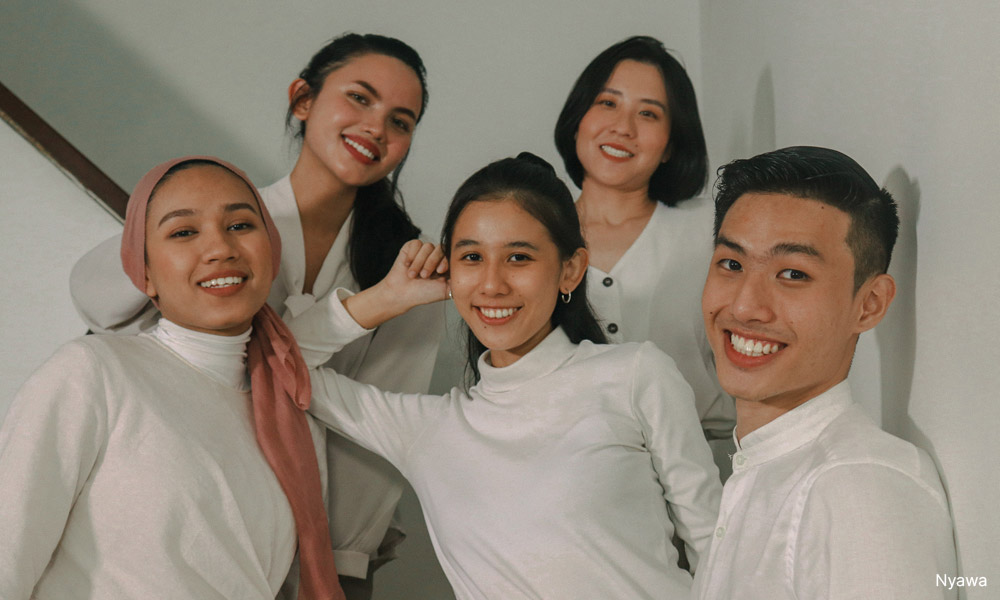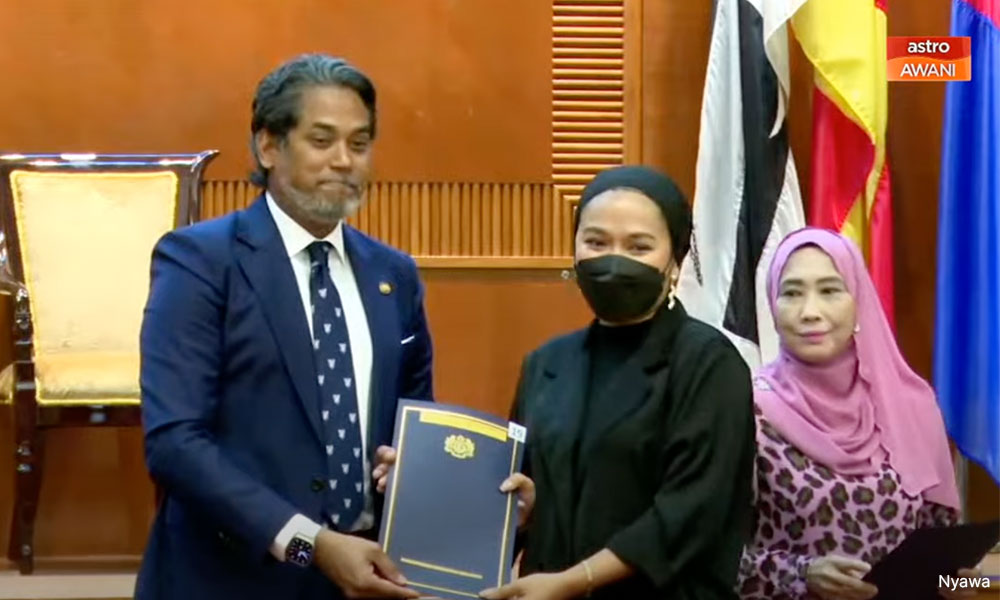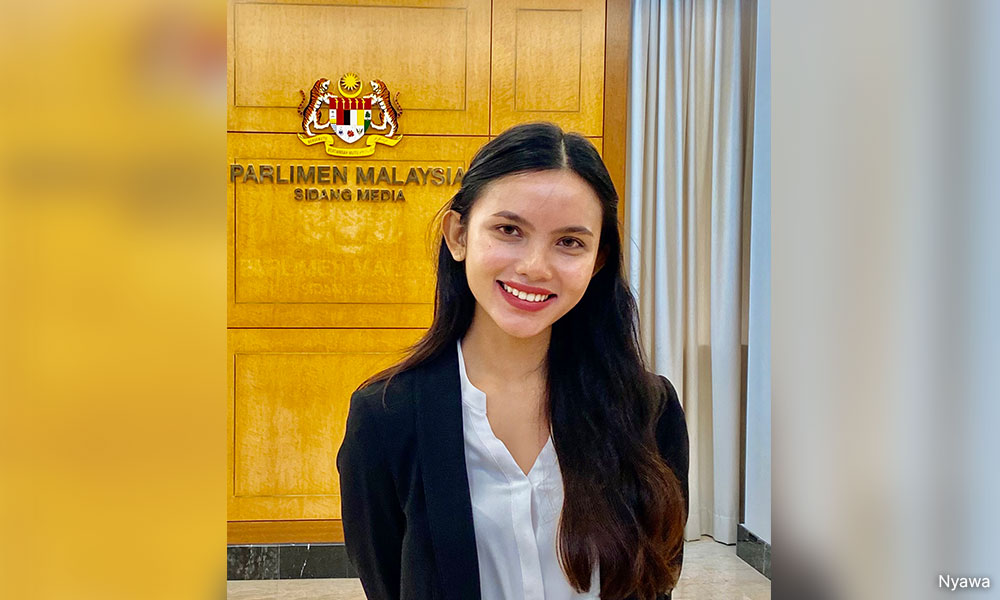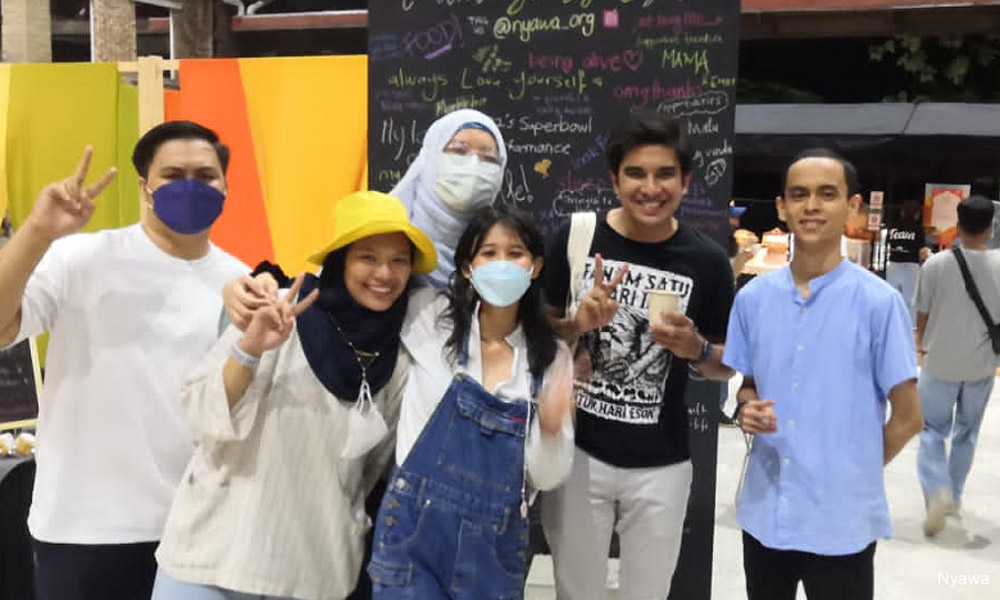In April 2021, mental health organisation Nyawa was founded by director Farihin Ufiya Mohd Azeem to bring about mental health reforms that are not only progressive and bold but also feasible and sustainable.
Along with advocacy lead Jernell Tan, research lead Chew Gui Fang, and deputy director Khair Hisham, the four co-founders aim to bridge the gap between youthful enthusiasm and seasoned wisdom.
Together with administration lead Aisya Wahida, they plan to help as many underprivileged people as they can to deal with mental health issues.
According to Farihin, 25, it began as an ad hoc project called Inisiatif Menyantuni during the 2021-2022 Malaysian flood crisis to provide free counselling services to flood victims who faced mental health challenges.
“However, we received many distressing requests from non-flood victims who could not afford therapy.
“This initiative was subsequently extended to the B40 community (Inisiatif Menyantui B40 2.0 [1MB40]) with the idea of offering subsidised therapy sessions for those facing life and livelihood challenges.

“We decided to focus on the B40 community because the association between economic inequality and poor mental health is well-established, whereby the experience of socioeconomic disadvantage, low income, unemployment, poverty, debt, and poor housing are associated with poor mental health,” she told Malaysiakini.
There is limited access to affordable mental health services for the B40 community. So, alongside similar initiatives by other NGOs and the Health Ministry, IMB40 aims to offset the costs borne by affected individuals.
“According to the Health Ministry, mental illness is one of the leading causes of disability and health loss in Malaysia, accounting for 8.6 percent of total disability-adjusted life-years.
“In terms of economic costs, according to Relate Malaysia, by 2018, mental health-related economic losses were estimated at RM14.46 billion (or over one percent of national GDP),” she explained.
Stigma attached to mental illness
Farihin recently completed her Master’s in neuroscience at the University College London (UCL) under the Yayasan Khazanah Global Scholarship. She is a published mental health researcher and a summa cum laude psychology graduate.
She is also an actress and film director.
With stigma attached to mental illness and many reluctant to seek the help that they so badly need, how does one broach the subject to strangers?

“Stigmas and prejudices surrounding mental illness, exacerbated by ignorance and misinformation about the topic, can make it challenging to have a transparent conversation about one’s mental struggles,” said Farihin.
“Being an enabler and offering resources - such as affordable, quality services, and language accessibility, as well as a safe environment for people who struggle with mental health to open up at their own speed, are key components to overcoming these societal barriers.
“1MB40 serves as a platform for the B40 groups, who have been cited frequently as being one of the biggest groups to suffer from mental illness,” she explained.
All the sessions Nyawa conducts are currently on a one-on-one basis. They charge RM5 per session for participants the B40 group.
“A total of 219 people signed up for the latest instalment of IMB40 and all the slots were filled within 48 hours. However, we will be recruiting new volunteers soon and opening new slots by the end of October,” she said.
As for the RM5 charge, she said it was a good practice to charge a minimal fee for mental health services to encourage commitment from clients.

“Past research found that a small fee increases the psychological value of the session, which leads to greater improvements in mental health outcomes. We had some instances of no-shows when we offered free sessions. Thus, we’ve decided to charge RM5.”
On specific mental health challenges, she explained that the experience of being triggered is an emotional response to a disturbing topic that reminds one of past traumatic experiences.
“Triggers vary from person to person and can be internal (anger, sadness, loneliness) or external (a specific location, a certain scene in the movie, a social situation).
“Although one may feel like you are losing control of getting triggered, one can empower oneself by preparing to cope with triggers - by learning to recognise physical reactions/signs to a trigger (e.g. changes in breathing) and employ corresponding strategies to cope with such situations.”
Funding the initiative
Nyawa has two sources of funding to sustain its operations. The first source of funding is grants from donors, which are approved after having undergone proposal application processes.
The second source of funds from the public, either in the form of donations for programmes such as the IMB40 initiative, or honorariums for public education outreach events, such as talks or workshops.
Awas and Yayasan ZuriatCare funded the latest instalment of 1MB40.
“For the IMB40 initiative, we recruited volunteers who are counsellors and clinical psychologists, who are trainees or registered professionals.

“All therapy sessions are done online. As a token of appreciation for their contributions to the initiative, we give honorariums at fixed rates to these volunteers,” Farihin said.
She pointed out that mental health advocacy in Malaysia is in its infancy and is not without challenges.
Many are unable to transition from being aware of mental health issues to taking action.
This proves there is a need for a comprehensive structure that supports sustainable advocacy in the long run, she said.
“Nyawa strives to keep the momentum going. Compared to pre-pandemic days, more Malaysians are receptive to talking about mental health and seeking mental health support.”
There is greater public awareness of critical issues now, such as the rise in suicide cases during the pandemic, she said, adding that the government’s efforts to prioritise the mental health agenda have also helped.
Perceived social stigma and a sense of embarrassment are among the key barriers to openness and help. This is something that can be seen in people from all age groups.
Farihin notes that there is a higher prevalence of women and girls suffering from mental health conditions such as depression and anxiety. They are generally more likely to be open to seeking mental health support.
“Men and boys, overall, experience more barriers. One such primary barrier is stigma. Men and boys are still subject to rigid traditional masculinity.
“They are expected to be emotionally invulnerable and ‘deal with their internal issues’ without any outside help.
“For those who are survivors of gender-based violence, male and female survivors alike may hesitate to seek mental health support due to fear of not being taken seriously or being re-victimised by victim-blaming behaviour.” - Mkini



No comments:
Post a Comment
Note: Only a member of this blog may post a comment.